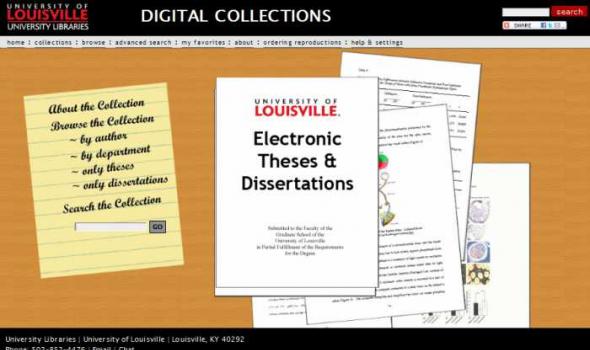Category: Text, English, University of Louisville, Louisville
Results
DIGITAL COLLECTIONS About the Collection University of Louisville students produced their first yearbook, The Colonel , in 1909. The Colonel apparently ceased publication after the 1912 edition, leaving a gap in the documentation of student life until 1922, when its successor, The Kentucky Cardinal , began monthly publication during the school year, with the June edition serving as a de facto yearbook. By 1924, the school year-end annual edition of The Kentucky Cardinal had been renamed The Thoroughbred , a title which lasted until 1972, despite a somewhat sporadic publishing record (no issues were produced in 1932, 1934-1938, 1943, 1945-1946, and 1970-1971).
DIGITAL COLLECTIONS About the Collection Since 2002 the University Libraries have been building a collection of color digital copies of theses and dissertations authored here at the University of Louisville. This effort is in keeping with an international trend of institutions migrating to electronic theses and dissertations (known as ETDs) in order to provide free worldwide access to these titles and to enable graduate students to include digital media in their works. Both the University of Louisville's Graduate School and J.B. Speed School of Engineering incorporated the utilization of digital technologies into their thesis and dissertation guidelines. In July 2006 the Speed School's guidelines were amended so that only an electronic copy will be submitted to the Ekstrom Library.
DIGITAL COLLECTIONS About the Collection The Oral History Center at the University of Louisville has long sought to aid in the documentation of the history of Louisville's African American community. This effort was bolstered in the 1970s by funding from the Kentucky Oral History Commission, which supported a number of the interviews included in this first online offering. The African American Oral History Collection includes interviews conducted as part of projects designed to document particular aspects of Louisville's history and/or important local institutions, such as the Red Cross (Community) Hospital and the Louisville Municipal College, as well as projects that sought to document African American life more generally. Most of the interviews were conducted in the late 1970s.






















